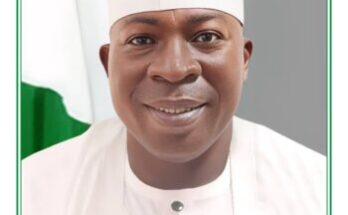Dr. Adedoyin Salami, is the chair, Fiscal Round Table of the Nigeria Economic Summit Group. In this interview with BENJAMIN UMUTEME, on the sidelines of the NES, Dr. Salami says the country’s debt servicing ratio is at a high level. He also spoke on the low level of government’s tax revenues among other issues.
What are your views on Nigeria’s tax administration system?
If Nigeria is going to grow her fiscal space has to be expanded, any which way you look at it. As we heard from some of the conversations earlier today, we are collecting 7.5 per cent of our total GDP in revenue given the African average is about 22.5 per cent, it tells you that we are potentially collecting 1/3 of what we could collect if we matched the African average. Imagine we had more revenue, the opportunities for development through effective and efficient government spending on areas of national priority that boost the economy improves significantly. So that is why we are trying to see how we can expand that fiscal space to be able to achieve what we’ve just been saying. It’s to try and look at your goal series of things. We are very clear. This is what we are saying. The how must be there. The issues and challenges must be addressed so that by the time ideas, proposals are put to the government towards trying to get an expansion of Nigeria’s fiscal space.
What are the gaps you have identified in Nigeria’s tax system?
At the heat of Nigeria’s tax system is how we are raising revenue. Revenue earned from non-oil taxation is ridiculously low. You are looking at somewhere around 3 per cent of GDP and the moment you recognize that the non-oil is 90 per cent of the economy and yet contributes3 per cent to the economy. Then it is a striking contrast as the point on over dependence on oil is already clear from just this figure. 90 per cent of the economy producing 3 per cent of government revenue, there is a problem. And the key question is; what’s the problem? Is it that there are sectors that are not just amenable to changes? Is it that we are not collecting the taxes? Its those questions that we want to find answers to.
Is the NESG fiscal round table out to drive the advocacy of the non oil sector?
Fiscal policy is both expenditure and revenue. A lot of the conversations have been around revenue simply because we don’t have money to spend. If we had money to spend then we could do more for the people. For us, that would be….and you had my contribution back there that you can continue to ask people to pay if they don’t feel they are getting value for their money. That’s the expenditure part. Our mandate is not an exclusive revenue driven mandate; its part revenue, in part expenditure.
Sustainability of Nigeria’s debts levels vis-à-vis revenue. You say it has gotten to an alarming level. Can you expatiate on that?
It is not a matter of if; it has gotten to an alarming level. When you get to a situation where at current levels almost 50 per cent of government revenues will be needed to service debt. A lot has been said as to how the debt to GDP ratio is still very low. However, what is relevant is the debt service to government revenue ratio. And what we are looking at in that area depending on how you measure it is a minimum of about 45-46 per cent and in some measures it’s as high as 56 per cent. That is why the IMF Resident Representative was very clear that even though it appeared to go down between 2016 and 2017 but the only reason it has gone down between 2016 and 2017 is because oil price has given us higher levels of revenue. It’s not as if indebtedness has gone down. If you look at the MTEF, the government’s strategy to keep interest rates from rising is to try and borrow from the international capital market rather than the domestic market. And so the challenge is a very real one. If you are going to bring your debt service to revenue down, then there are only two ways: either your debt service goes down or your revenue go up. And which is where the point about if we were to raise revenue then we certainly will see that ratio come down. But again, I must emphasise that the expenditure side is as important as the revenue side.
What is the nature of fiscal governance?
Drawing from the OECD, fiscal governance refers to those rules, regulations and procedures that influence how budgetary policy is planned; approved; implemented; monitored and evaluated. Its key building blocks include–budgetary statistics supplying detailed information on budgetary developments (expenditure, revenues, public debt etc.) which are critical for budgetary analysis and forecasts at all levels of governments; numerical fiscal rules which “set in stone” quantitative thresholds for budgetary aggregates (for example, budget deficit cannot exceed a certain percentage of GDP); multiannual budgetary frameworks with defining strategic budget planning (in terms of spending, revenue, debt etc.) for more than one year, consistently with the traditional annual budget planning; independent national fiscal institutions which, independently from governments and parliaments, assess the quality of budget making in all transparency (for example, a fiscal council publicly assessing whether the annual budget complies with the national numerical fiscal rules); and budgetary procedures defining the methodology for forecasting, the coordination arrangements across government levels for budgetary matters and other processes.
In the light of the above, how can we optimize fiscal governance?
There are several questions that you need to find answers to. How do we ensure fidelity to rules and procedures adopted heretofore? Do procurements adhere strictly to the provisions of the Public Procurement Act 2007? What punitive measures apply to breaches of provisions of the Public Procurements Act and Fiscal Responsibility Act, 2007? How do we get back to a meaningful budget planning and implementation cycle? How do we move beyond reliance on macro data for budgetary planning to accommodate micro data as well? This leads to the issue of enhancing adopted rules and procedures. This also raises questions as to whether the Medium Term Expenditure Framework (MTEF) processes adhere to a reasonable fiscal cycle? How do we resolve the budget cycle misalignments? Can we institutionalize an empirical oil price benchmark process to avoid rifts between the Executive and the Legislature? This also calls for the entrenchment of the audit function within the entire architecture of governance across and beyond MDAs requiring subnational governments to do likewise. However, there is need to do a philosophical rethink. Regardless of lacking clarity on how fiscal policy balances revenue optimization and growth, there needn’t be a trade-off between the two. Although revenues need to be scaled up significantly, such might not suffice to meet the enormity of spending needs. This also brings to the fore the Nigerian Integrated Infrastructure Master Plan which carries a $100bn annual spending requirement. And for context, aggregate spending across the three tiers came to $43.2 billion in 2017, against aggregate revenue of $23.9 billion which tells you that although plugging revenue shortfalls are important, can Nigeria really scale up revenues and spending to the required levels without disrupting the economy? This also brings into question the critical role private capital will play in plugging resource shortfalls in Nigeria’s fiscal governance strategy



